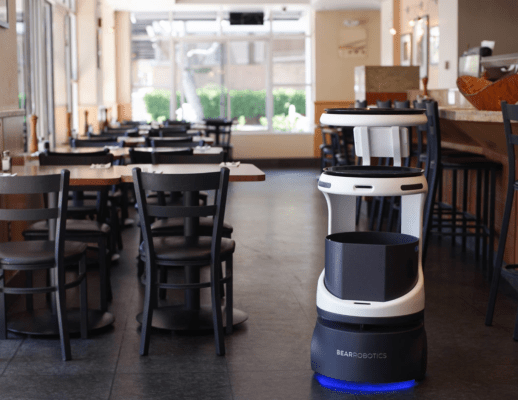ARTICLE AD

LG Electronics may no longer be a household name in smartphones, but it still sees a big future in gadgets like robots. Today, the company confirmed a $60 million investment in Bear Robotics, the California startup that makes artificial intelligence-powered server robots for restaurants and other venues — autonomous tray towers on wheels that are meant to replace waiters. With the investment, LG Electronics becomes Bear’s largest shareholder.
Bear’s last fundraise in 2022 valued the company at just over $490 million post-money, per PitchBook data. It’s not clear what the valuation is for this latest investment but the last year has not been a great one for startups in the space.
On the other hand, the current vogue for all things AI, and the general advances that are coming with that, are giving robotics players a fillip — see yesterday’s Covariant news, for another example. Still, it’s not clear what Bear hopes to tackle next with the basic trays-on-wheels form factor that its adopted for its flagship Servi robots.
We’ve contacted Bear and LG for further comment.
The Bear investment comes nearly two months after LG CEO William Cho hinted at LG’s interest in equity investments in robotics specializing in delivery and logistics at CES 2024 in January: the company is putting money where its mouth is.
After LG shut down its struggling mobile business globally in April 2021, the Korean electronics and appliance giant shifted its business focus to other growth areas, including smart homes, connected devices, the Internet of Things (IoT), electric vehicle (EV) components and robotics and artificial intelligence platforms.
“As the service robot market enters a period of growth, this equity investment will significantly contribute to securing a ‘Winning competitive edge’ for the company,” Lee Sam-soo, chief strategy officer at LG Electronics said in its statement. “From a mid-to long-term perspective, we will seek to develop our robot business into a new growth engine, exploring various opportunities through the integration of cutting-edge technologies such as Embodied AI and robotic manipulation.”
This investment is not LG’s first robotic business. The Korean electronics company has been researching and developing software and hardware in robotics. In 2017, LG deployed guide robots at South Korea’s largest airport, Incheon International Airport, per its statement.
Bear was founded in 2017 by John Ha, a former Google software engineer turned restaurateur, who witnessed how challenging things could get. Ha’s firsthand experience with the challenges of running a restaurant inspired him to develop serving robots.
The SoftBank backed startup operates its indoor delivery robots in the U.S., South Korea, and Japan. These serving robots, designed to help deliver food to restaurant customers, have been successfully deployed in various settings.
“Just as Android revolutionized the smartphone era, standardized open platforms are essential for the activation of the robot market,” Ha said.
Just last month, LG CEO had a meeting with Meta founder Mark Zuckerberg to discuss the two companies’ potential strategic collaboration on extended reality (XR) device development. In late November, LG set up an extended reality (XR) team as part of the organization reshuffle to expedite the development of an XR device, aiming for 2025.

 1 year ago
93
1 year ago
93 

